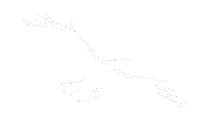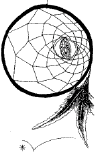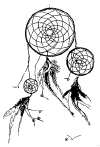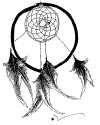Commands. Imperative
Imperative is formed with suffixes. Suffixes differ
depending on a category of a verb. We will not discuss all the details
(slight differences depending on stem of a verb) and will encounter just
suffixes and not examples:
Examples of imperative see in
Verb Paradigms.
Imperative suffixes for vta verbs:
| |
you s. suffix
|
you pl. suffix
|
we suffix
|
| me |
-shin |
-shig |
xxx
|
| us |
-shinaam |
-shinaam |
xxx
|
| him |
|
-ig |
-aadaa |
| them |
|
-ig |
-aadaanig |
| yourself |
-dizon |
-dizog |
-dzodaa |
| each other |
xxx
|
-dig |
-didaa |
Imperative suffixes for vti verbs:
| |
class 1
|
class 2
|
| you s. |
-an |
-n |
| you pl. |
-amok |
-ok |
| we |
-andaa |
-daa |
Imperative suffixes for vai verbs:
|
Suffix
|
| you s. |
-n |
| you pl. |
- g |
| we |
-daa |
We'll take for example two vai verbs: namadabi (he sits)
and biindige (he enters):
namadabi-n = sit (you s.)!
namadabi-g = sit (you pl.)!
namadabi-daa = let's sit!
|
biindige-n = enter (you s.)!
biindige-g = enter (you pl.)!
biindige-daa = let's enter! |
Prohibitive Imperative
In Prohibitive Imperative a prohibitive word gego
(don't do!) and special suffixes are used. Examples of Prohibitive see in
Verb Paradigms.
Prohibitive Imperative suffixes for vta verbs:
| |
you s. suffix
|
you pl. suffix
|
we suffix
|
| me |
gego -shiken |
gego -shikegon |
xxx
|
| us |
gego -shikangen |
gego -shikangen |
xxx
|
| him |
gego -aaken |
gego -aakegon |
gego -aasidaa |
| them |
gego wiinwaa -aaken |
gego -aakegon |
gego -aasidaanig |
| yourself |
gego -dziiken |
gego -diziikegon |
gego -dizosidaa? |
| each other |
xxx
|
gego -dikegon? |
gego -disidaa |
Prohibitive Imperative suffixes for vti verbs:
| |
class 1
|
class 2
|
| you s. |
gego -angen |
gego -ken |
| you pl |
gego -angegon |
gego -kegon |
| we |
gego -anzidaa |
gego -sidaa |
Prohibitive Imperative suffixes for vai verbs:
|
Suffix
|
| you s. |
gego -ken/-gen |
| you pl. |
gego -kegon/-gegon |
| we |
gego -sidaa/-zidaa |
If a verb ends in a consonant, "k" in a suffix changes
into "g": /-gen/, /-gegon/.
Examples:
gego namadabi-ken � don't sit (you s.)!
gego namadabi-kegon � don't sit (you pl.)!
gego namadabi-sidaa � let's don't sit!
gego dagoshin-gen � don't arrive (you s.)!
gego dagoshin-gegon � don't arrive (you pl.)!
gego dagoshin-zidaa � let's don't arrive!
"Yes/no" Questions and Negations
"Yes/no" questions,
which need "yes" or "no" answer are formed using special question marker - a
word ina or na. It always stands after the first word in a
question:
giwiisin ina? = are you eating?
giminikwe na? = are you drinking?
ginamadab ina? = are you sitting?
gigii-anokii na bijiinaago? = did you work yesterday?
giwii-izhaa na adaawewigamigong waabang? = will you go to the store
tomorrow?
Negations are formed with a
word gaawiin = «no, not» and a negative suffix /-sii/ or /-zii/
for vai and vta, /-siin/ or /-ziin/ for vti and vta, /-sinoon/
or /-zinoon/ for vii. A consonant in a suffix depends on a stem
ending - 's' after a vowel and 'z' after a consonant:
gaawiin niwiisinisii = I'm not eating
gaawiin niminikwesii = I'm not drinking
gaawiin ningii-anokiisii bijiinaago = I didn't work
yesterday
gaawiin niwii-izhaasii adaawewigamigong waabang = I won't go
to the store tomorrow
Negative suffix is added at the end of a verb in singular.
But in plural it is usually put before plural suffix for vai verbs or
between singular and plural parts of a suffix of vti-s and vta-s:
gaawiin wiisini-sii-wag = they are not eating
gaawiin niwaaband-an-ziin = I don't see it
gaawiin niwaaband-an-ziin-an = I don't see them
gaawiin niwaabam-aa-sii = I don't see him
gaawiin niwaabam-aa-siin-aan = we (exc) don't see him
Questions with: who, what, when, where, why, etc.
Questions with words: who, what, when, where, why, etc are
formed in a different way than "yes/no" questions. Verbs in these questions
stand in B form (or conjunct order). Initial vowel change in B form
(changed conjunct) occurs in this case:
/a/ becomes /e/,
/aa/ becomes /ayaa/,
/e/ becomes /aye/,
/i/ becomes /e/,
/ii/ becomes /aa/,
|
/o/ becomes /we/,
/oo/ becomes /waa/,
/ji/ becomes /ge/,
/ga/ becomes /ge/. |
Note. Though B form with an initial vowel change is used
in different regions usually in the same cases, it could be formed
differently in different subdialects. This rule of an initial vowel change
occurs in its complete form only in Minnesota Ojibwe. In other subdialects
it is very much reduced and often replaced with other grammatical changes (preverbs
e-, gaa-, etc.)
Initial vowel change affects also past and future tense
prefixes: /gii-/ changes into /gaa-/, /ga-/ into /ge-/,
and /wii-/ into /waa-/. Initial vowel change affects the first
syllable of a verb, making no difference of what this first syllable
actually is - tense prefix, preverb or a verb itself.
aaniin ezhinikaazoyan? = what is your (s) name
(how are you called)?
aaniin ezhinikaazod? = what is his/her name (how is s/he called)?
aandi ezhaayan? = where are you (s) going?
aaniish pii gaa-dagoshing? = when did s/he arrive?
aaniin = what, how
aandi = where
aandi onji = where from
aniish pii = when
In answers A form (independent order) is used:
aaniin ezhinikaazoyan? - ojiig nindizhinikaaz
what is your s. name? - my name is Marten
aaniish pii gaa-dagoshinan? - ningii-dagoshin bijiinaago
when did you s. arrive? - I arrived yesterday
Note. Questions with 'where'.
In Ojibwe verbs can contain so called relative roots, which always
show initial vowel change in B form. Izhi- and onji- are most
often used examples of such roots. These roots force initial vowel change of
a verb in B form.
Questions with 'where' (despite other wh-questions) don't need
initial vowel change in a verb (B form without initial vowel change is used
there). But in these questions mostly verbs with relative roots are used. So
initial vowel change occures in where-questions very often. Though it is not
a grammatical rule for where-questions, but a result of using words with
relative roots.
Obviative
First of all here is an excerpt with short linguistic
explanation of obviative:
"Obviation is a grammaticized system of organization in
which 3rd persons are ranked in prominence, and where this ranking has
consequences for the morphosyntax.
"In Algonquian all third persons are ranked in prominence.
The most prominent 3rd person in the span is called the PROXIMATE; all
others are called OBVIATIVES. If there is only 3rd person in the span, it
will, by default, be the proximate. If there is more than one, one will be
the proximate; all others will be obviative. Proximates occur whenever there
is a 3rd person. Obviatives arise only in contexts involving multiple 3rd
persons. Given that multiple 3rd persons must be ranked in obviation status.
Three factors emerge as relevant, one semantic (a), one syntactic (b), and
one pragmatic (c):
a. Animates outrank
inanimates; humans generally outrank animates. (including vii verbs
obviative - not discussed here - weshki-ayaad)
b. A genitive outranks its
head. (= 3rd person possessive - weshki-ayaad)
c. A more topical 3rd person
outranks a less topical one." (Judith Aissen)
We will encounter two last cases (b and c) only in these
notes and will do it upside down, so -
Obviative is a change of vta verb, an animate noun (and
animate demonstrative pronouns and verbs, used with that noun) which are
used with 3d person animate subject. Because of this change obviative is
sometimes called the 4th person. Obviative appears:
1) If an animate subject stands in 3d person (singular or
plural) and takes a vta verb and an animate object (= does something with
any animate object). Then both vta verb and object (and demonstrative
pronouns and verbs, used with the object) change their forms. This changed
form is called � obviative.
2) If an animate noun in possessive form belongs to a
possessor, which stands in 3d person (singular or plural). Then this noun
(and demonstrative pronouns and verbs, used with this noun) change their
form into obviative.
Nouns and verbs in obviative take special suffixes.
Demonstrative animate pronouns in obviative are changed into plural
inanimate demonstrative pronouns regardless to real number.
Noun obviative suffix is /-an/, or /-n, -yan,
-wan/.
There is no fixed word order in sentences in Ojibwe
language. Both subject and object could be placed before or after a verb
freely. The main sense of obviative in this case is to distinguish a subject
(main, proximate third person) from an object (other, obviative third
person), cause if both of them are in 3d person the verb could belong to
either of them.
In the next incorrect sentence with no obviative it is absolutely impossible
to tell where is a subject and where is an object:
x nimbaabaa o-noondawaan ma'iingan x [x my father
he-hears-him a wolf x]
Obviative suffixes solve this problem easily:
nimbaabaa onoondawaan ma�iinganan = my father
hears the wolf.
nimbaabaayan onoondawaan ma'iingan = the wolf hears my father.
nimbaabaa � my father (no obviative)
omaamaayan � his mother (obviative)
nimbaabaa omaamaayan � my father's mother
White Eagle Soaring: Dream Dancer of the 7th Fire


See
Real Dream Catchers' links
This is a crazy world. What can be
done? Amazingly, we have been mislead. We have been taught that we can
control government by voting. The founder of the Rothschild dynasty, Mayer
Amschel Bauer, told the secret of controlling the government of a nation
over 200 years ago. He said, "Permit me to issue and control the money of
a nation and I care not who makes its laws." Get the picture? Your freedom
hinges first on the nation's banks and money system. That's why we
advocate using the
Liberty Dollar, to understand the
monetary and banking system. Freedom is connected with
Debt Elimination for each individual. Not
only does this end personal debt, it places the people first in line as
creditors to the National Debt ahead of the banks. They don't wish for you
to know this. It has to do with recognizing WHO you really are in
A New Beginning: A Practical Course in Miracles.
You CAN
take
back your power and
stop volunteering to pay taxes to the collection
agency for the BEAST. You can take back that which is yours,
always has been yours and use it to pay off your debts. And you can send
others to these pages to discover what you are discovering.
Disclaimer: The
statements on www.real-dream-catchers.com have not been evaluated by the FDA.
These dream catchers are not intended to diagnose nor treat nor cure any
disease or illness
© 2007, Allen Aslan Heart / White Eagle Soaring of the Little Shell Pembina Band, a
Treaty Tribe
of the Ojibwe Nation






 Get
a course to promote your business online, explode your sales
Get
a course to promote your business online, explode your sales Get
software to promote your business online in less time
Get
software to promote your business online in less time Get
software to streamline your business and run it hands free.
Get
software to streamline your business and run it hands free.